Index
And Now for Something Completely Different. Kind of.
Movies discussed in this section:
![]()
![]()
![]()
![]() The Deal (2003)
The Deal (2003)
![]()
![]()
![]()
![]()
![]() The Queen (2006)
The Queen (2006)
![]()
![]()
![]() The Special Relationship (2010)
The Special Relationship (2010)
Offering an alternative to the American political and presidential system, albeit with eventual American crossover, these movies, which comprise playwright and screenwriter Peter Morgan's "Tony Blair Trilogy," indeed provide an insight into top-level British politics, specifically, the prime ministry in the wake of the reign of Margaret Thatcher, Britain's prime minister from 1979 to 1990, often likened to the British Ronald Reagan (although Thatcher took power before Reagan did) as both shared a hardline conservative ideology and worked hard to implement it, subsequently altering the political landscape of both Britain and the United States.
To redress the impact of Thatcher and John Major, Thatcher's successor and fellow member of the Conservative Party, Tony Blair and Gordon Brown, both leading lights in the Labour Party, which was falling into disarray, inevitably became rivals when Labour had a shot at retaking power in the 1997 elections, as The Deal details. And although The Queen, set following the death of former Princess Diana in 1997, centers on the royal family, specifically, Queen Elizabeth II, the incoming Blair administration has a better grasp of the impact of Diana's death—will it share that with the royals? Finally, The Special Relationship sees Blair reaffirming that titular US-British alliance with President Bill Clinton, already in his first term and sharing advice when Blair becomes the leader of the Labour Party in 1994—will Clinton maintain that bond when Blair becomes prime minister in 1997?
![]()
![]()
![]()
![]() The Deal (2003)
The Deal (2003)
Directed by Stephen Frears. Written by Peter Morgan.
Taking a deep dive into British prime ministry politics in the 1990s, following Conservative rule since 1979, the compact docudrama The Deal examines the power struggle between two of the opposition Labour Party's heavyweights, Tony Blair (Michael Sheen) and party golden boy Gordon Brown (David Morrisey), the heir apparent to the "big job"—the prime ministry—and the agreement they struck that enabled Blair to leapfrog Brown into that "big job."
Working from Morgan's lean, sharp, scrupulously researched script, Frears pares the drama to the essence, focusing always on the central dynamic, the relationship between colleagues-turned-rivals Blair and Brown, while parsing out the larger national context that drives their relationship, such as Thatcher's fall from power, Labour's subsequent failure to win the 1992 elections, and the 1994 death of Labour's leader John Smith that created the power vacuum into which Blair stepped. Portraying Brown, Morrisey conveys effectively the Scot's brusque, dour public persona while manifesting his drive and acumen for both political process and public policy. Portraying Blair, Sheen moves from being Brown's junior partner to a party mover-and-shaker with a seamlessness that compensates for missing hints to Blair's ultimate ambition.
Viewers expecting a dramatic confrontation will find a more pragmatic resolution instead, and the ramifications of the Blair-Brown "deal," presumably understood by Brits, are not addressed, while Frears's documentary atmosphere ensures a modest cinematic scope. For thoughtful viewers, though, The Deal is a smart, reasoned insight into recent British politics.
![]()
![]()
![]()
![]()
![]() The Queen (2006)
The Queen (2006)
Directed by Stephen Frears. Written by Peter Morgan.
Make no mistake: A brilliant Helen Mirren is firmly at the center of The Queen as Elizabeth II in this compelling dramatization of events surrounding Princess Diana's 1997 death. Mirren's absorbing, richly nuanced portrayal forms the fulcrum between the royals' detached attitude and the mass outpouring of grief—a popular sentiment that the Queen eventually realizes she might have misjudged badly as public displeasure with the royals' official silence mounts.
However, it is incoming Labour Prime Minister Tony Blair (Michael Sheen) who correctly gauges the public mood—his communications director Alastair Campbell (Mark Bazeley) famously dubs Diana "the People's Princess"—and who grasps that the royal family has failed to do so save for Prince Charles (Alex Jennings), who surreptitiously forges ties with Blair. Overcoming the politely imperious treatment Blair, accompanied by his anti-monarchist wife Cherie (Helen McCrory), got initially from Her Royal Highness, he urges the Queen to reverse the official course as Diana's funeral approaches.
Mirren's resignation and dignity in these scenes are masterful, with Roger Allam's turn as crucial royal advisor Robin Janvrin subtly rendered, although performances by Jennings, James Cromwell (portraying Prince Philip), and Sylvia Syms (the Queen Mother) teeter on parody at times. Alexandre Desplat's quietly magisterial score underpins Morgan's crackling script and Frears's assured, unobtrusive direction, buttressing Mirren's stellar performance and Sheen's solid one at the center of The Queen.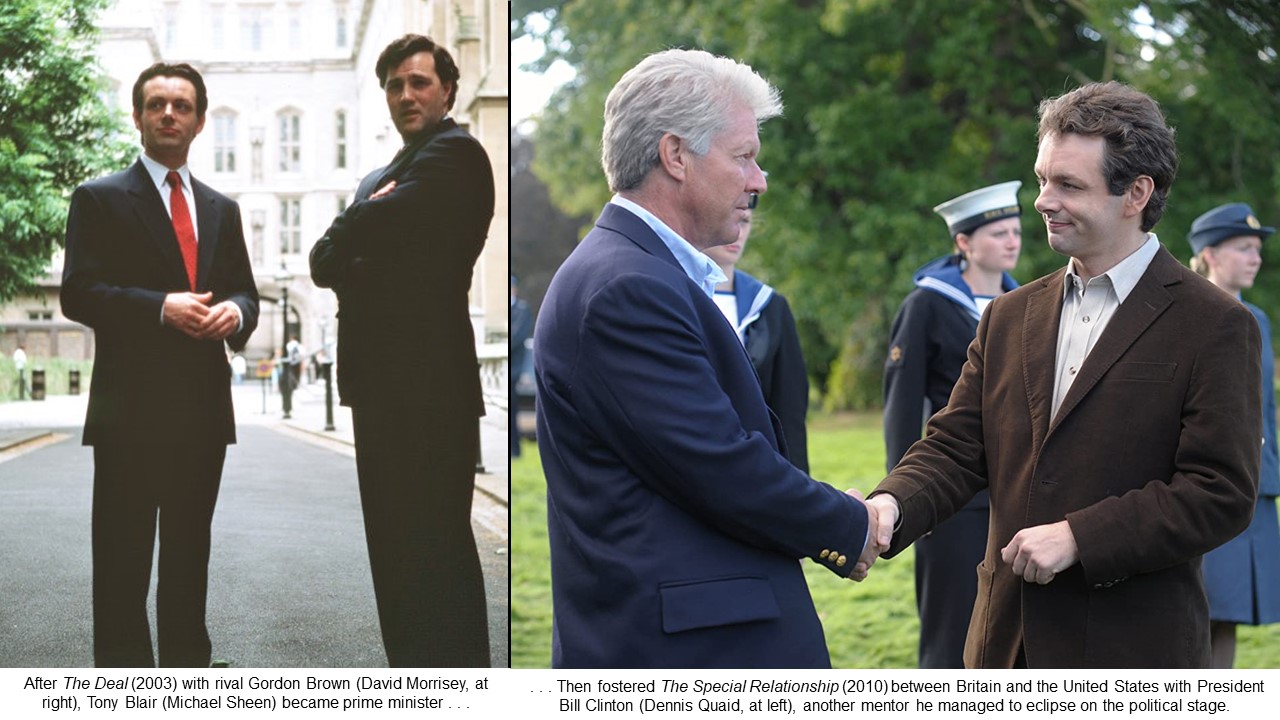
![]()
![]()
![]() The Special Relationship (2010)
The Special Relationship (2010)
Directed by Richard Loncraine. Written by Peter Morgan.
The third of Morgan's profiles of Tony Blair, The Special Relationship focuses on the British Prime Minister's interaction with U.S. President Bill Clinton with less acuity than Morgan's previous efforts as Michael Sheen returns to portray Blair and Dennis Quaid portrays Clinton, in his first term when new Labour Party leader Blair gleans political pointers from Clinton staffers. By 1997, those pointers have helped Blair become Prime Minister, and he continues the "special relationship" Britain enjoys with the United States and its president, now becoming embroiled in the Monica Lewinsky scandal.
Morgan's customary schematic depicts Blair as the neophyte with an intriguing blend of guileless ambition and genuine fellowship to learn from the established public figure before emerging as the ascendant one. Here, Blair's insistence on escalating NATO's offensive role in the relief of Kosovo ushers him past Clinton and onto center stage, to Clinton's private chagrin as Quaid chooses to portray Clinton as more brooding and manipulative than his public image suggested.
Once more emphasizing the leaders' domestic lives, Helen McCrory reprises her solid portrayal of Cherie Blair, a shade more astute than her husband but still supportive, but Hope Davis, immediately evoking Hillary Clinton without mimicry, practically steals every scene she's in, particularly those with only Quaid. Lacking Stephen Frears's incisive guidance, The Special Relationship does exhibit the punch-pulling of the made-for-cable production it is, and as it ends with Clinton's departure, the next story that surely needs to be told is Blair's much more momentous relationship with George W. Bush.
Sublimely Ridiculous
Movies discussed in this section, listed here alphabetically and discussed chronologically below:
![]()
![]()
![]()
![]() The Great Dictator (1940)
The Great Dictator (1940)
![]() Idiocracy (2006)
Idiocracy (2006)
![]()
![]()
![]()
![]() Mars Attacks! (1996)
Mars Attacks! (1996)
![]()
![]()
![]()
![]() Monty Python's Life of Brian (1979)
Monty Python's Life of Brian (1979)
![]()
![]()
![]() The President's Analyst (1967)
The President's Analyst (1967)
![]()
![]()
![]() Red Planet Mars (1952)
Red Planet Mars (1952)
![]()
![]()
![]() Rufus Jones for President (1933)
Rufus Jones for President (1933)
![]()
![]() Wild in the Streets (1968)
Wild in the Streets (1968)
We end our voters' guide on a tongue-in-cheek note with eight movies that use the presidency and politics for sublimely ridiculous purposes. Humor, whether spoof, satire, or silliness, is the most prevalent purpose, although one or two movies with ostensibly serious intent might not be in on the joke. Because the settings for these wacky gems range across both time and space with no other unifying theme, it is perhaps safest just to discuss them in order of when they were unleashed upon an unsuspecting viewing public.
![]()
![]()
![]() Rufus Jones for President (1933)
Rufus Jones for President (1933)
Directed by Roy Mack. Story by A. Dorian Otvos and Cyrus Wood.
Rufus Jones for President might be the most provocative movie in this guide. On its surface, it's a pleasant fantasy about mother and child sharing an actual dream of his becoming president of the United States before they wake up to reality again. But with an almost entirely African-American cast making this musical short in the Jim Crow era, this lively flight of fancy exhibits both admirable ambition and, to contemporary eyes, cringe-worthy stereotypes and tropes of black culture and behavior that seem to reinforce then-current prejudices.
Harassed by an older neighbor boy, Rufus Jones (Sammy Davis, Jr.) returns to his mother's (Ethel Waters) arms on the porch of their modest house where she cautions him to "stay on his side of the fence" while also encouraging him with speculation that he could also grow up to be president. After both fall asleep—voilà!—each dreams that he has been elected president, one who presides over the Senate as it debates the appointments of (ahem) the "dice president" and a "commissioner of poultry."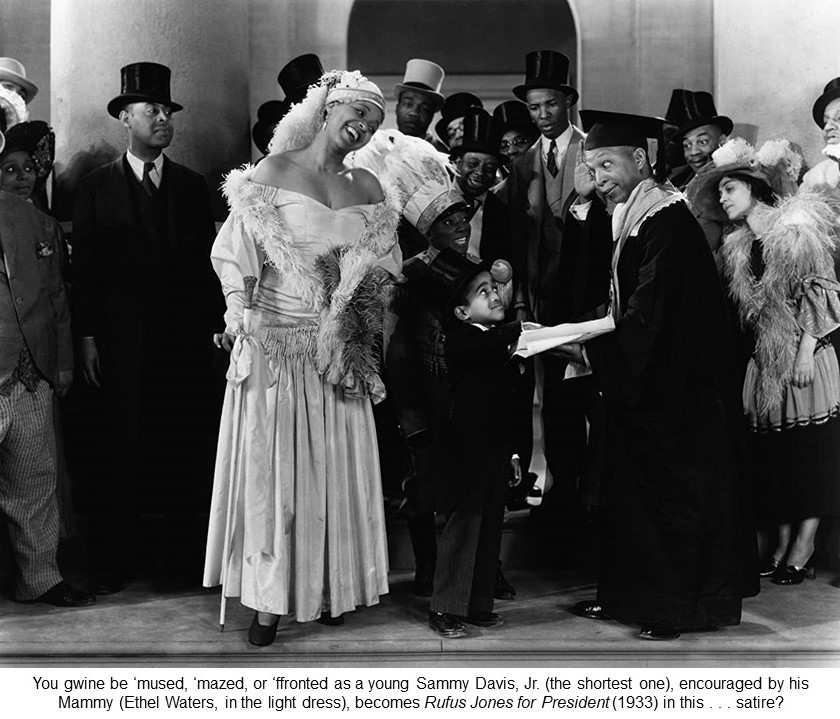
Is this really winking satire? That's difficult to gauge although the overriding focus on musical entertainment tips the scales toward blithe mockery. Already a Broadway star, Waters delivers marquee renditions of "Am I Blue?" and "Underneath the Harlem Moon" as seven-year-old Davis wows them with amazing tap-dancing in this historical curio that provides a fascinating yardstick on racial attitudes while also packing an entertaining musical wallop.
![]()
![]()
![]()
![]() The Great Dictator (1940)
The Great Dictator (1940)
Written and directed by Charlie Chaplin.
With an audacity that borders on scandalous, Charlie Chaplin almost single-handedly confronts Adolf Hitler and the Nazis, already in control of much of Europe, with the biting satire of The Great Dictator, which hardly disguises Chaplin's political targets as it unloads its moral lambasting through the twin barrels of slapstick and wit. Wielding broad humor throughout—including the deathless mistaken-identity gambit—Chaplin pauses for thoughtful reflection while this silent-film icon embraces sound to deliver an impassioned closing speech redolent of his trademark pathos.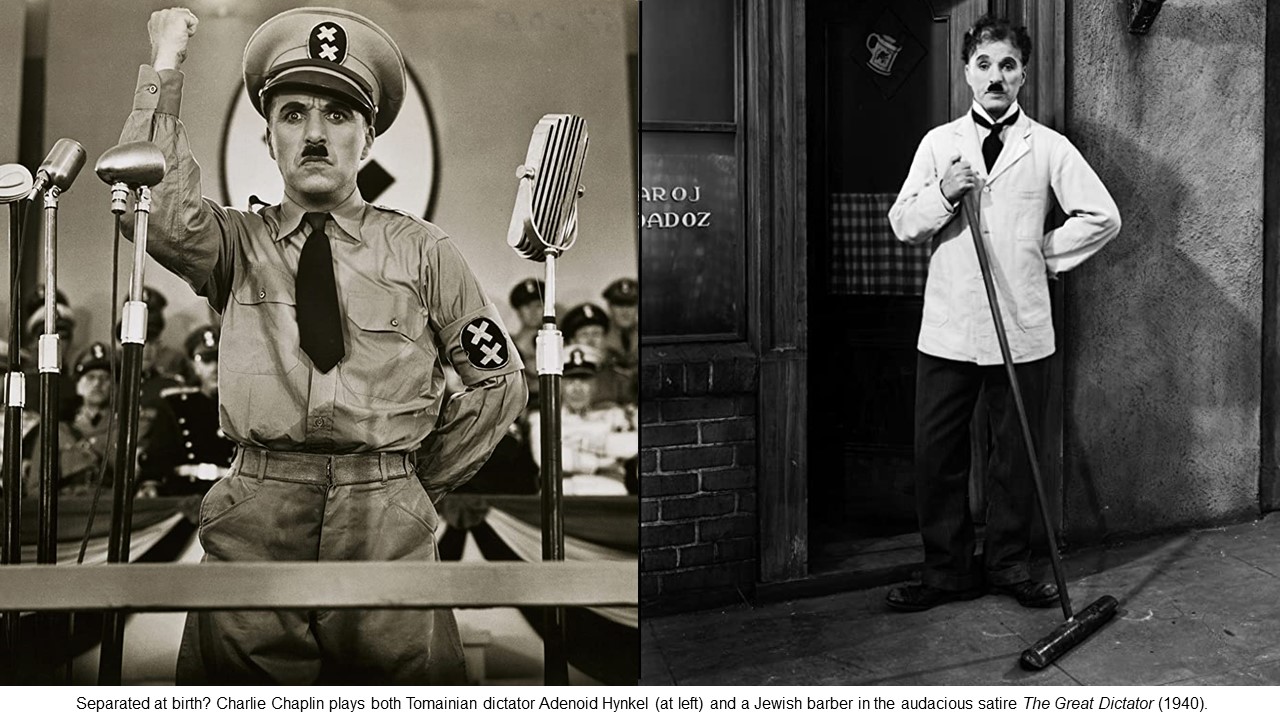
As Tomainia is defeated at the end of the First World War, a Jewish barber (Chaplin) saves a wounded pilot, Schultz (Reginald Gardiner), before succumbing to his own injuries. When the Barber regains his memory 20 years later, Adenoid Hynkel (Chaplin) and his Double-Cross Party have seized power in Tomainia, subdued the Jewish ghettoes, and are poised to invade neighboring Osterlich. Schultz, now a party leader, nevertheless protests Hynkel's crackdown on the Jews; he and the Barber, a dead ringer for Hynkel, are imprisoned but escape to enact the final twist. Chaplin's caricature of Hitler is brilliant but not one-dimensional, posturing boorishly, then ruminating privately at the piano and during his unforgettable ballet with an inflatable globe in this rich, brave, fervent political broadside.
![]()
![]()
![]() Red Planet Mars (1952)
Red Planet Mars (1952)
Directed by Harry Horner. Written by John Balderston and Anthony Veiller, based on the play Red Planet by Balderston and John Hoare.
A fascinating example of Cold War propaganda, the heavy-handed Red Planet Mars uses science fiction as a cudgel to bludgeon viewers with Western superiority over the godless communism behind the Iron Curtain. In fact, driving force Balderston had been a member of President Woodrow Wilson's Creel Committee, the propaganda body that tried to muster enthusiasm for America's entry into the First World War. Despite the polemics pounded home throughout and at the ginned-up ending, Red Planet Mars sustains interest as a historical curio.
Two attempts to contact Mars immediately establish the dichotomy: Affluent suburban couple Chris (Peter Graves) and Linda Cronyn (Andrea King) run a cozy mom-and-pop transmitting station near San Diego while former Nazi scientist Franz Calder (Herbert Berghof), now working for the Soviet Union, huddles in a transmitting hovel high in the icy Andes while being threatened by his communist handlers. The Cronyns begin to receive messages from Mars that astonish the world before causing global sociological and economic panics; the increasingly Biblical nature of the short but pointed Martian messages also sparks a religious war behind the Iron Curtain.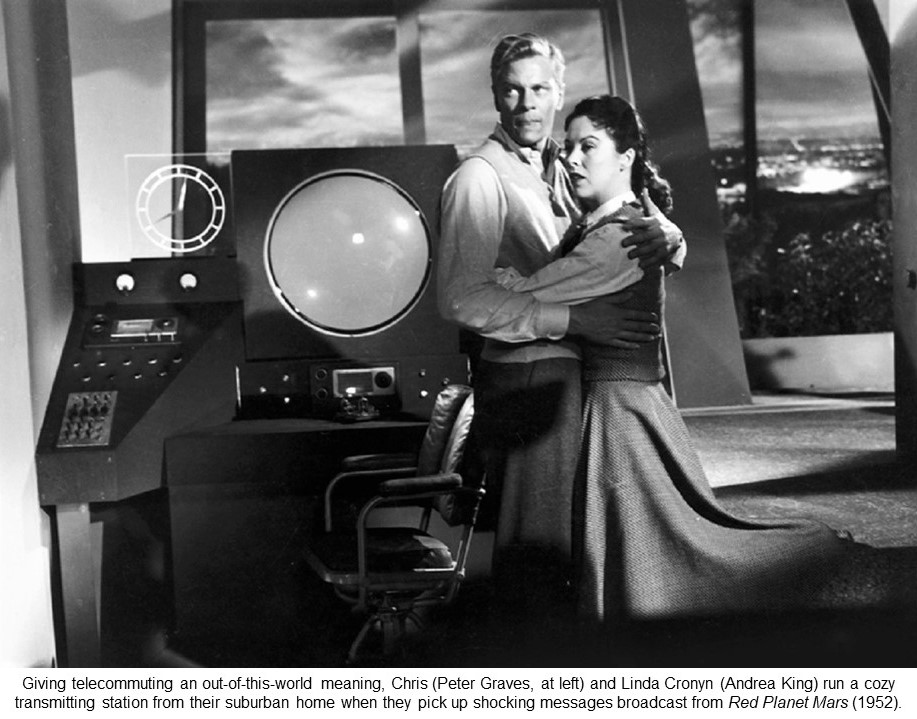
Even though plausibility is highly suspect at this point, Red Planet Mars proceeds with self-righteous confidence as Calder delivers a startling revelation in a finale that tries to paint a more credible—and terrestrial—explanation before going blooey as this nominally sci-fi thriller boldly oversells its message.
![]()
![]()
![]() The President's Analyst (1967)
The President's Analyst (1967)
Written and directed by Theodore J. Flicker.
Psychiatry, politics, paranoia, and psychedelia intertwine wickedly in The President's Analyst, a warped vision of the 1960s that takes aim at so many different targets that it's bound to hit a few of them now and then. Flicker's smart satire now looks dated but it digs deep enough into larger, more timeless truths to transcend that while his lampooning of specific institutions never seems to get old as psychiatrist Sidney Schaefer (James Coburn) is recruited by "Central Enquiries Agency" operative Don Masters (Godfrey Cambridge) to be The President's Analyst.
At first, Sidney is elated to be the president's analyst, although his need to be on-call at any time—those interruptions are often hilarious—and the ultra-secret nature of his service strains his relationship with girlfriend Nan (Joan Delaney). Moreover, Sidney begins to feel paranoid—only there really are people out to get him: spies from all over the world, including Russian assassin Kropotkin (Severn Darden)—and when Sidney goes on the lam to escape them all, he discovers the truth about who is really running the show.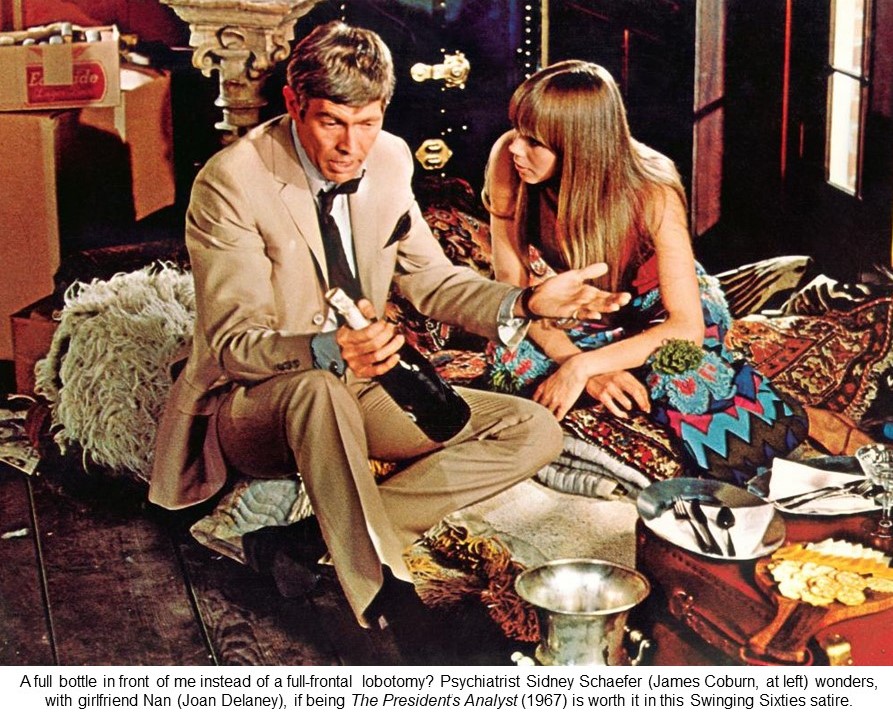
As the focal point, Coburn displays a relaxed charisma as his Sidney encounters violent suburban liberals, hippie musicians, and a robotic utility-company head. Clever but diffuse, The President's Analyst teeters between broad spoof and intellectual satire, imparting some comedic insight but lacking a clear breakthrough.
![]()
![]() Wild in the Streets (1968)
Wild in the Streets (1968)
Directed by Barry Shear. Written by Robert Thom, adapted from his novel The Day It All Happened.
Dripping with period audacity, Wild in the Streets satirizes its own warning and almost succeeds as a definitive 1960s statement, delivering a passel of period flashpoints from sex, drugs, and rock and roll to politics and especially the generation gap, with flashes of cogency that skirt parody even as events veer from unlikely to downright ludicrous. Max Flatow, Jr. (Barry Williams, then Christopher Jones), grows up with suburban middle-class parents (Bert Freed, Shelley Winters), but by adulthood he's discovered LSD and explosives and, as Max Frost, has become a rock star.
Meanwhile, to court the youth vote, senatorial candidate Johnny Fergus (Hal Holbrook) invites Max and his band to perform at his rally, where they call to lower the voting age ("Fourteen or Fight!"). And when band member Sally LeRoy (Diane Varsi) becomes a Congresswoman and introduces a Constitutional amendment to lower the office-holding age to 14, the youth movement spikes Washington's water supply with LSD to facilitate its passage, with Max eventually becoming President—as a Republican!—and instituting radical countercultural reforms as an even younger constituency begins to take shape.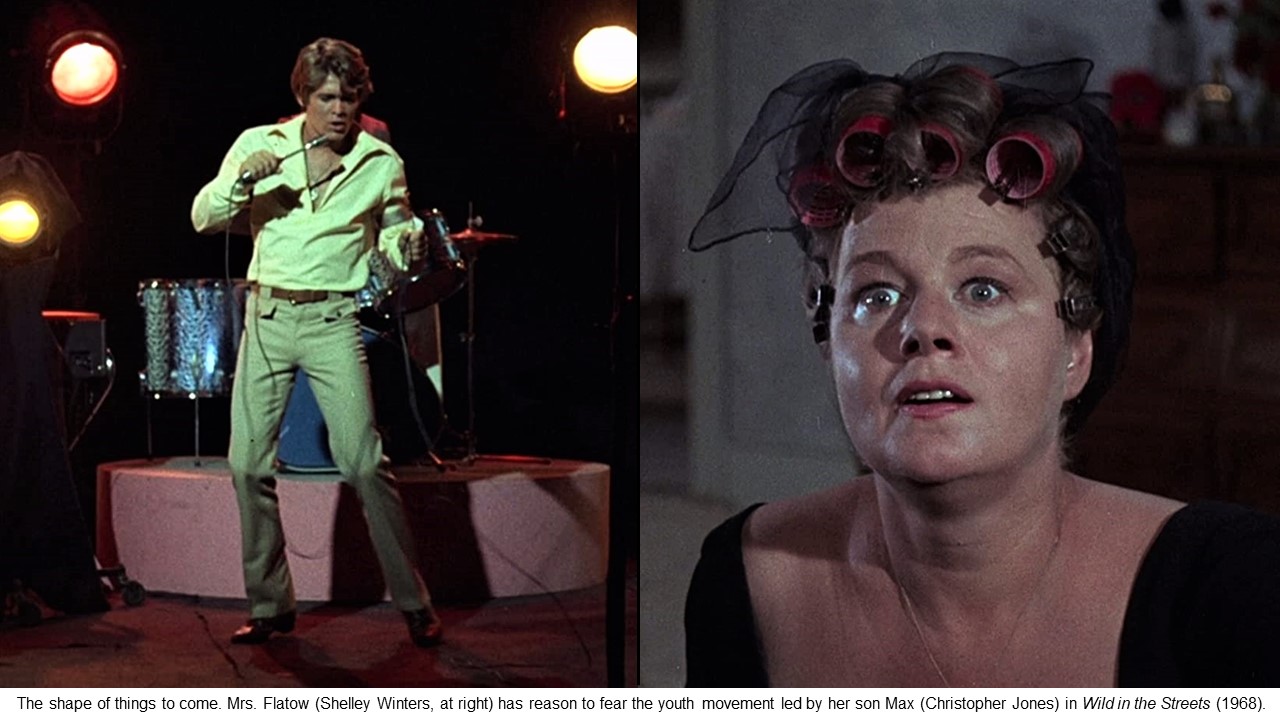
Credit the cast for their credulity amidst material ripe for campiness although Wild in the Streets still holds its tongue firmly in cheek. Jones displays limited presence as Winters fares best in an obviously over-the-top role. But despite producing a hit single ("Shape of Things to Come") along with its provocative potential, Wild in the Streets never grows up.
![]()
![]()
![]()
![]() Monty Python's Life of Brian (1979)
Monty Python's Life of Brian (1979)
Directed by Terry Jones. Written by Monty Python (Graham Chapman, John Cleese, Terry Gilliam, Eric Idle, Terry Jones, Michael Palin).
A British satire set in Judea at the time of Christ might seem to have no relation whatsoever to American presidential politics, but if Monty Python's Life of Brian can splice in a jab at Star Wars and make it work, then anything is fair game in this outrageously funny spoof that certainly takes knowing shots at radical politics and factional infighting.
Brian (Graham Chapman), who had the misfortune of being born next to the baby Jesus, attends—in a riotous scene of misinterpretation and petty squabbling—Jesus's Sermon on the Mount and winds up joining a political sect opposed to Roman occupation of Judea. In a wicked spoof of radical politics and factional infighting, Brian finds himself carrying out actions against the Romans that eventually land him before Pontius Pilate (Michael Palin). He escapes, but soon finds himself mistaken for the Messiah; despite his best efforts, he develops a rabid following, including a tryst with attractive rebel Judith (Sue Jones-Davies), that winds up getting him crucified.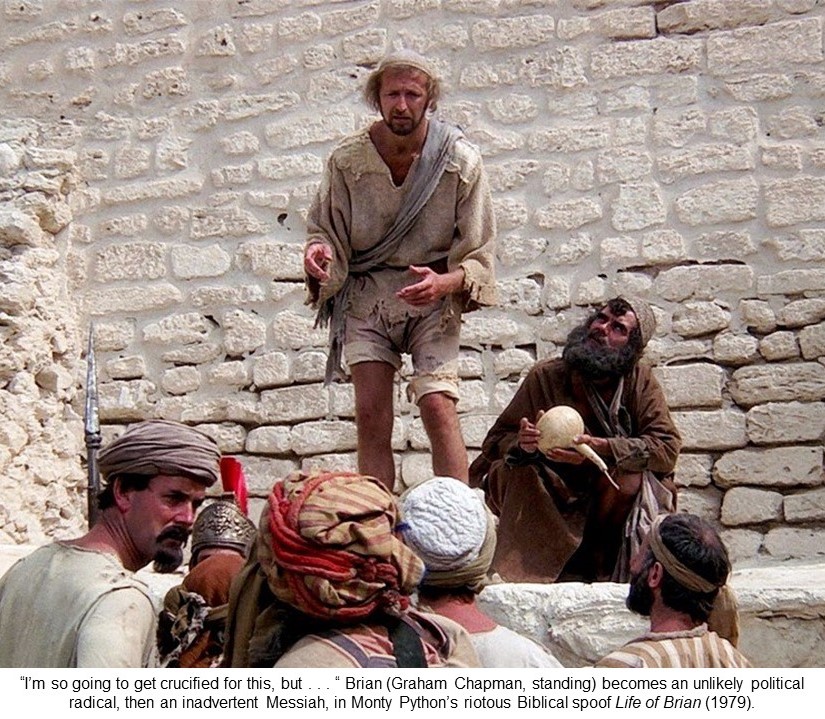
Brian's linear narrative and Jones's economical direction focus the story and enable the comic set-pieces to embellish the narrative, making Brian the best of the Python films. Sly swipes at Spartacus and, absurdly, Star Wars further enliven this terrific satire, although the crowning moment is the famous closing musical number, which is its own charming encouragement—we've all got to look on the bright side of life, right?
![]()
![]()
![]()
![]() Mars Attacks! (1996)
Mars Attacks! (1996)
Directed by Tim Burton. Written by Jonathan Gems, based on the trading-card series Mars Attacks by Topps.
More pungent, outrageous satire descends on an unsuspecting audience in Mars Attacks!—and this time there is an American president right in the middle of the chaos, President James Dale (Jack Nicholson), in this wicked spoof that lampoons so many targets at so many levels that it's a wonder it manages to remain both accessible and cohesive. It does, thanks to a tightly focused story that is intentionally modest, paying homage to 1950s sci-fi B-movies with deliberately cheesy special effects.
President Dale, alerted to a huge Martian armada orbiting Earth, gets advice from General Decker (Rod Steiger), who urges him to attack, and from Professor Donald Kessler (Pierce Brosnan), who urges him to welcome the Martians. But when Dale's emissary, Colin Powell parody General Casey (Paul Winfield), is vaporized by the Martians, the war of the worlds is joined as, in a sly twist, the eventual heroes (played by Annette Bening, Jim Brown, Pam Grier, Lukas Haas, Tom Jones, Natalie Portman, and Sylvia Sidney) are the misfits and the disenfranchised, the byproducts of tossing narrative convention into the pop-culture Cuisinart.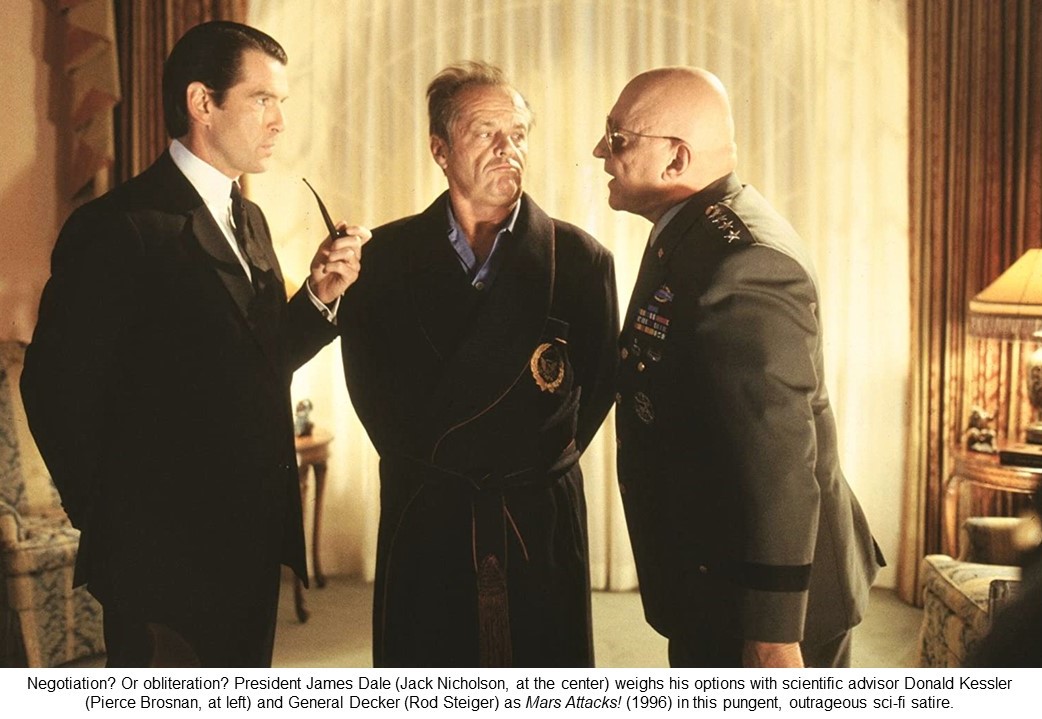
Both in appearance and attitude, Mars Attacks!, with its galaxy of stars, is as much a poke in the eye to lavish, hero-worship science-fiction films (I'm looking at you, Independence Day) as it is droll homage to classic sci-fi and the cult trading-cards series that give the film its distinctive look—along with its extravaganza of simultaneously shocking and cartoonish violence. After watching Mars Attacks!, you'll never listen to Slim Whitman the same way again.
![]() Idiocracy (2006)
Idiocracy (2006)
Directed by Mike Judge. Written by Judge and Etan Coen.
Idiocracy contains a brilliant premise: Natural selection goes haywire when smart people make rational choices about whether to have children—or not—while stupid people breed indiscriminately, spurring a de-evolutionary Gresham's Law that a few centuries later yields an intellectually retarded America that has degenerated into a base, moronic, barely functioning society. Unfortunately, Idiocracy's execution functions at the same level, and you can't hide behind the excuse that this is a comedy because its humor is just as lame and witless.
Judge and Coen, the Beavis and Butthead behind a dystopian vision based on the most simplistic and obvious gags, are to blame for this painful series of skits that becomes unbearable even over an admittedly modest running time. Even worse, the pop-culture memes five centuries from now—Starbucks, monster trucks, hip-hop chic, train-wreck television programs like Jackass—were already embarrassingly dated during production, while the tired time-travel trope puts Joe Bauers (Luke Wilson) and Rita (Maya Rudolph), two hapless volunteers from a military hibernation experiment carelessly abandoned, into predictable fish-out-of-water predicaments—
—Wait! Maybe that's the joke: We're already in an Idiocracy. Naw. We're not even in a Mediocrity when Joe, a more-average-than-average soldier, and Rita, a prostitute trapped in stereotype, have to find a time machine to escape the mindless consumption and entertainment that distracts from the problems plaguing the year 2505. Judge and Cohen couldn't even make it 2525 for a Zager and Evans joke (they were one-hit wonders with their 1968 song "In the Year 2525") that wouldn't have been worse than what made the final cut. Welcome to our brave new world, idiots.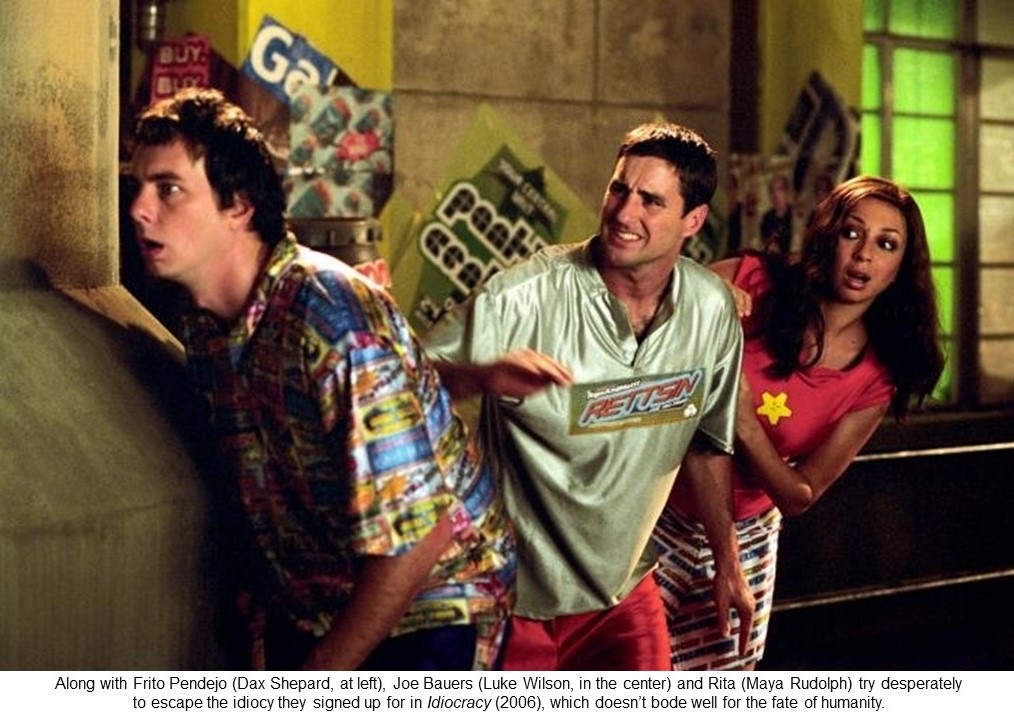
Exit Poll
Perhaps it is appropriate that we end this Voters' Guide to Presidential Movies with a movie that not only paints our future as being idiotic but is just as idiotic itself in depicting that future. But we truly are in a brave new world, politically and otherwise, and we face challenging times ahead, not the least in the social and political realms.
To offer a respite from those challenges, this Voters' Guide to Presidential Movies has profiled an array of movies that have ranged from the campaign trail to the media, from a specific political ideology to presidents and would-be presidents to one distinctive president in particular. It has also profiled scenarios of political upheaval in the United States and in other countries while taking a glimpse at politics in Great Britain, which has a "special relationship" with the US, and, to show that we can't take even serious matters seriously all the time, a wacky and humorous look at our political world.
Those last movies offer up distractions, and, indeed, all of our movies are at some level distractions from our lives and our society. But they also provide perspectives, even insights, into our personal and political worlds, informing and maybe even enlightening as they entertain.
Finally, this guide presents merely a drop in the bucket of movies with a political, and specifically a presidential, theme. What are some of the movies in this vein that are not profiled here? What are some of your favorite political movies? This is the exit poll—make your voice heard!



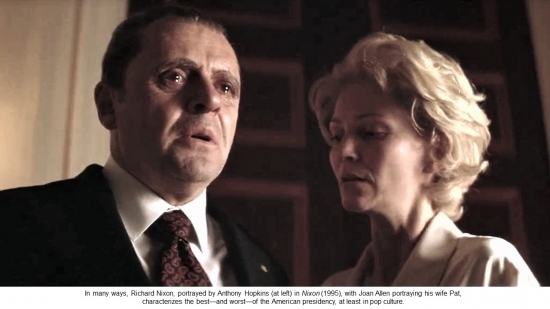
Comments powered by CComment